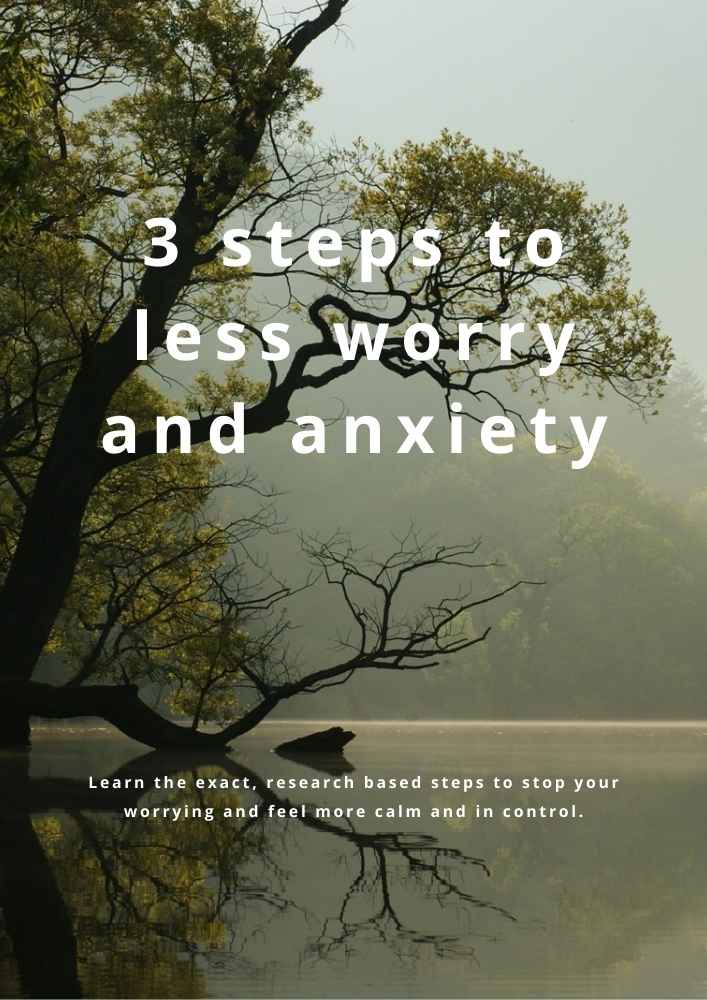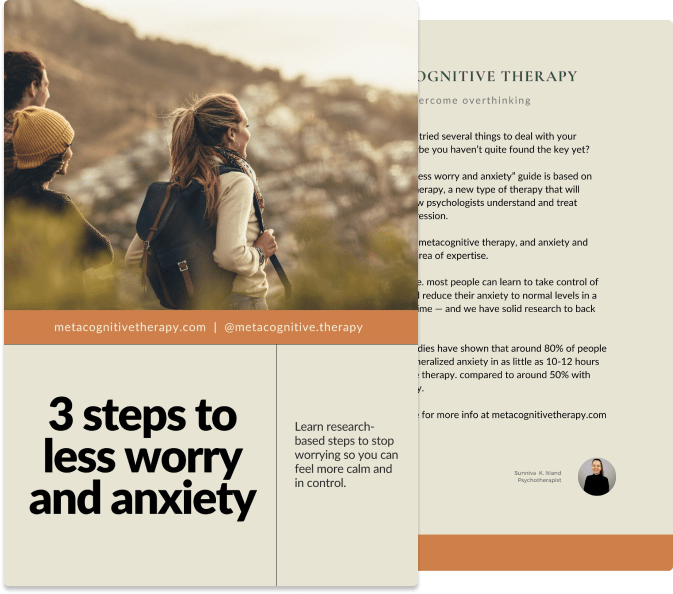Dealing with performance anxiety from a metacognitive POV

Download our best tips on reducing anxiety and worrying
Learn three powerful metacognitive therapy steps to stop the worry cycle, reduce anxiety, and feel calmer in everyday life.
.jpeg)
.jpeg)
Performance anxiety can be crippling, often exacerbated by common coping strategies that increase self-awareness and insecurity. Shifting focus outward and limiting rumination are key to overcoming this anxiety. Discover effective techniques to transform your approach and enhance confidence in presentations and performances.
You tremble, blush, and your heart is racing. What if they see that you're nervous? What will they think of you?
If you're struggling with performance anxiety, you may have heard that you just have to keep practicing, and you will eventually have less anxiety. So why are so many people still dealing with this crippling feeling? Because we're approaching it the wrong way.
What is performance anxiety?
Performance anxiety appears when you have to perform or present, often in front of other people, where they may have opinions about you and your delivery. This can range from leading meetings to public speaking, performing on stage, or even talking on the phone.
Many leaders, actors, singers and musicians struggle with performance anxiety, and many people avoid or quit jobs they are initially good at, and enjoy, to avoid the anxiety.
Why do you get performance anxiety?
For some, it starts out with a bad experience. If you've ever gotten brain fog or severe anxiety while presenting in front of others, it’s understandable that you might want to avoid it. Performance anxiety can be incredibly uncomfortable, and often it feels uncontrollable. People then tend to worry a lot in advance of presentations, envisioning worst-case scenarios and trying to anticipate solutions.
The worries can start weeks or months in advance and often increase as time approaches, creating concentration issues and difficulty functioning at work.

Download our best tips on reducing anxiety and worrying
Learn three powerful metacognitive therapy steps to stop the worry cycle, reduce anxiety, and feel calmer in everyday life.
Coping strategies actually maintain anxiety
Many people implement a whole range of measures or coping strategies to deal with performance anxiety. They may:
- Avoid presentations altogether.
- Have an excuse ready to escape if need be.
- Talk themselves down, or say something about being sick or having slept poorly, to preemptively apologize in case the presentation is not on point.
- Take a sedative.
- Spend an incredible amount of time preparing.
- Have something to hold on to.
- Write down everything you need to say.
- Speak quickly and say as little as possible.
Scientific research on Metacognitive Therapy found that coping strategies can in fact maintain anxiety. This metacognitive understanding is a radical break from traditional beliefs, because these coping strategies continue to draw your attention inwards towards yourself, which increases your self-awareness. At the same time, coping strategies take up mental energy so you have less attention left to focus on the performance itself.
Coping strategies can make you more insecure
You can become dependent on these coping strategies, crediting them if the presentation goes well. They maintain a sense that you need them, which means you spend more time dealing with the possibility of losing control and how to avoid it.
This also sends a strong signal to the brain that presentations are something quite dangerous and scary, which increases anxiety.
Nevertheless, many are afraid that if they let go of their coping strategies, they will:
- Make a fool of themselves
- Forget their presentation
- Faint or shake
- That others will see that they have anxiety
How did I really appear, and what do they think of me now?
Ruminating and self-evaluation also maintain performance anxiety. Many people spend a lot of time mentally reviewing their own performance, diving into thoughts such as:
- How did I appear?
- Did they see that I was nervous?
- What do they think of me now?
- I forgot to say…!
- Maybe I shouldn’t be a leader / actor / musician?
That rumination and self-evaluation, mixed with self-criticism, can last anywhere from a few hours to several days or weeks. The goal of the rumination is usually to get an answer about how you appeared, what you could have done differently, and to learn something for the next time. The goal can also be to find an answer to why you struggle with performance anxiety so that you can find a way to overcome the anxiety.
But you may not find the answer to why you have anxiety, how you appeared, or what to do differently next time. What is certain is that prolonged self-evaluation and self-criticism lead to melancholy and low self-esteem. What may have felt like an ok, if not perfect, presentation right after you finished it, eventually appears as a total disaster when you have been critically fixating.
Treating performance anxiety: what helps?
Here are some general tips that will be useful for most people.
1. Limit worrying. It’s normal to worry when performing or presenting something, but try to limit the time you spend imagining disaster scenarios and how to deal with them.
2. Let go of coping strategies. Coping strategies steal focus and confidence.
3. Direct your focus outwards and not inwards towards yourself when presenting.
4. Limit ruminating and self-criticism after you finish your presentation. Feeling insecure is normal, but if you dwell in these thoughts you will only feel worse, and your performances won't get any better.
The next time you encounter a speech or performance that could trigger anxiety and worry for you, try this new perspective to shift your focus and limit the time you spend anticipating the worst.
Metacognitive Therapy for Workplaces
Did you know that we offer specialized Metacognitive Therapy programs designed specifically for businesses? The program aims to tackle stress and burnout head-on with our evidence-based approach, transforming thinking styles and behaviors for a more productive, confident, and thriving workforce. Read more



